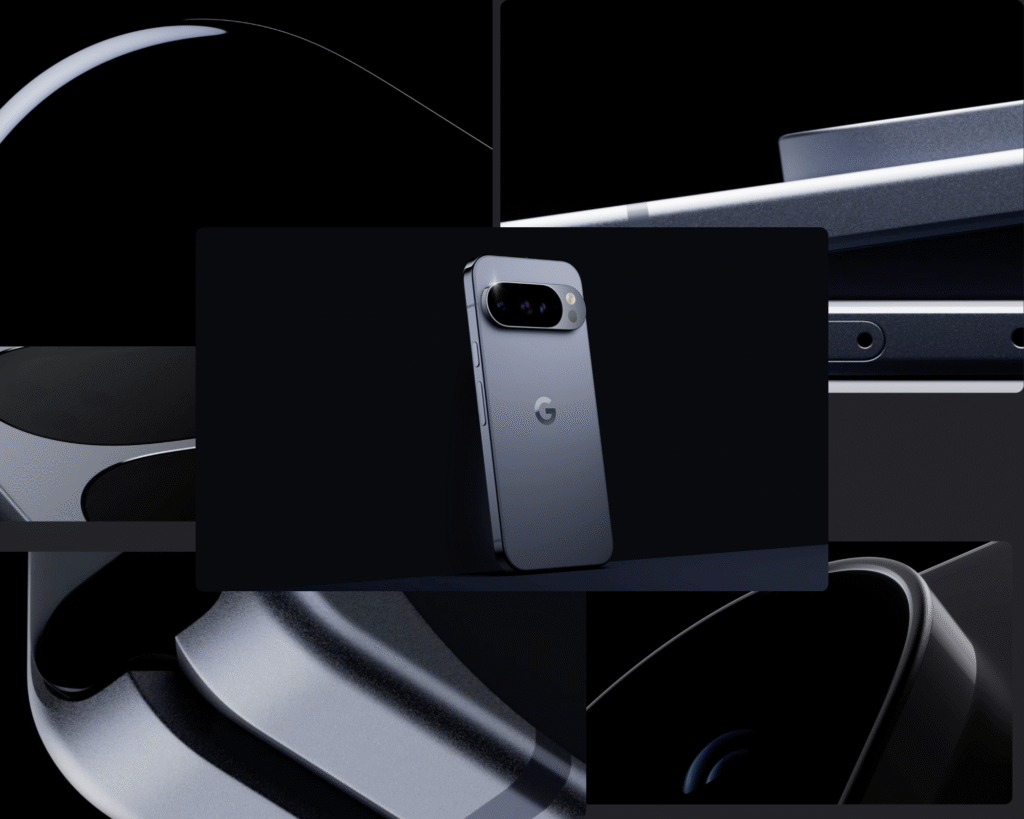
As Google’s Brooklyn spectacle unfolds tonight, one professional’s journey through the ecosystem wars
- The Contradictions We Live With
- Act I: The Theatre of Innovation Unfolds
- The Fallon Gambit: Entertainment as Ecosystem Strategy
- The Uncomfortable Mathematics of Aspiration
- The AI Paradox: Personal Experience Meets Marketing Reality
- The Ecosystem Wars: A Professional's Pragmatic Polygamy
- Google's Strategic Insecurity: Playing Apple's Game
- The Indian Market: A Microcosm of Global Dynamics
- What Google Gets Right: Credit Where Due
- The View from Across the Digital Divide
- Lessons for Digital Marketing Professionals
- As the Curtain Falls
The Contradictions We Live With
I write this on my MacBook Pro, but I’ll search for sources using Google. I’ll analyse the data through Claude, cross-reference findings on Perplexity AI, and probably end up using ChatGPT to distil complex market dynamics into digestible insights. My iPhone sits charging beside my iPad, whilst Microsoft Office hums in the background—because, let’s face it, nobody’s found a better alternative for collaborative editing yet.
This isn’t hypocrisy so much as pragmatism.
As a digital marketing and communications professional who’s spent the better part of a decade watching the tech industry’s great performance, I’ve learned that “the technology we champion isn’t always the technology we depend upon.”
Tonight, as Google stages its spectacular Made by Google event in Brooklyn—complete with Jimmy Fallon’s polished banter and a celebrity roster that reads like a talk show host’s fever dream—I find myself contemplating the curious mathematics of desire, loyalty, and market reality that define our digitally native existence.
Act I: The Theatre of Innovation Unfolds
At precisely 1 PM ET (10:30 PM for those of us following from India), the curtain rises on what promises to be less a product launch than a cultural manifesto.
Google has enlisted Jimmy Fallon alongside Stephen Curry, Lando Norris, and the Jonas Brothers—a lineup that suggests someone in Mountain View believes the future of smartphones lies not in silicon but in social capital.
The irony isn’t lost on me. Here’s Google, a company built on algorithmic precision, betting its premium hardware future on the ancient art of celebrity endorsement. It’s rather like watching a chess grandmaster suddenly decide to play poker—technically possible, but raising questions about whether they understand the game they’re actually playing.
The Fallon Gambit: Entertainment as Ecosystem Strategy
Fallon’s presence isn’t accidental.
After Microsoft’s calculated courtship of Trevor Noah—installed as their “Chief Questions Officer” to explore AI’s societal implications—Google needed its own cultural counterweight.
Where Noah’s arrangement radiates intellectual gravitas, positioning Microsoft as steward of society’s digital conscience, Fallon brings something altogether different: the suggestion that artificial intelligence can be entertainment, that you needn’t understand neural networks to buy into the future.
The subtext proves unmistakable: AI can be fun. AI can entertain. You need only tap “add to cart.”
It’s a fascinating strategic divergence. Microsoft’s Noah partnership operates as thought leadership—the comedian exploring how AI tackles global challenges through thoughtful dialogue. Google’s Fallon gambit transforms product positioning into pure spectacle, prioritising immediate cultural relevance over sustained intellectual engagement.
As someone who regularly switches between various AI tools depending on the task at hand, I appreciate the attempt at accessibility. But there’s something unsettling about reducing the complexity of machine learning to late-night comedy beats, especially when the underlying technology remains so demonstrably imperfect.
The Uncomfortable Mathematics of Aspiration
The evening celebrates ten generations of Google’s Pixel line, rendered in sparkly teasers threaded with Dr. Dre’s “The Next Episode”—a sonic signature that simultaneously suggests progression and delivers a coded critique of Apple’s approach to innovation.
“Why wait for ‘coming soon’ when you can have ‘here, now, and with a better punchline’?” the campaign asks, with the confidence of a company that seems to have forgotten its own market position.
The numbers tell a rather different story than tonight’s spectacle suggests.
In Q2 2025, Google shipped 800,000 Pixel devices in the United States—capturing merely 3% of American market share. Samsung, by contrast, shipped 58 million smartphones globally, while moving approximately 8.3 million units in the US alone—outselling Pixel by 10 to 1 even in Google’s strongest market.
The global picture proves even more sobering:
- United States: Pixel’s strongest market, where it trails Apple by sixteen-fold
- Europe: Pixel manages roughly 400,000 quarterly units across EU5 markets—hovering below 2% market share
- China: Pixel remains essentially non-existent, lost in regulatory hurdles and outcompeted by local giants
- India: Despite significant investment, Google holds under 4% of the premium segment

The AI Paradox: Personal Experience Meets Marketing Reality
This brings us to perhaps the evening’s central tension—Google’s positioning as the AI smartphone leader, despite my own experience with its AI tools proving frustratingly inconsistent.

I’ve tested Google’s AI search extensively, often finding myself returning to Perplexity for research and Claude for analysis. The experience reflects broader industry concerns: AI search engines provide incorrect answers over 60% of the time when citing news articles, with Google’s systems showing “alarming confidence” despite frequent inaccuracies.
Users consistently report that Gemini’s API responses are lower quality than those in AI Studio, with the system ignoring constraints and delivering “substantially less comprehensive analysis.”
For someone whose professional life depends on accurate information processing, this isn’t merely disappointing—it’s professionally problematic.
Yet here’s where Google’s story becomes more nuanced. Their computational photography genuinely leads the market. The Pixel’s camera processing, particularly in challenging lighting conditions, often outperforms more expensive alternatives. Night Sight revolutionised smartphone photography, and their Portrait mode algorithms remain remarkably sophisticated.
The Ecosystem Wars: A Professional’s Pragmatic Polygamy
My technology choices reflect what I suspect is an increasingly common pattern among digital professionals: platform agnosticism born of functional necessity rather than brand loyalty.
I use an iPhone because Apple’s ecosystem integration remains unmatched for daily productivity. Messages, calendar, and notes sync seamlessly across my Mac and iPad, creating the frictionless experience that Google’s marketing promises but doesn’t quite deliver. iOS’s privacy controls provide genuine peace of mind in an industry where data is currency.
Yet I search with Google because, accuracy issues notwithstanding, it remains superior for information discovery. Their search algorithms, refined over decades, understand context and intent in ways that alternatives haven’t matched. When I need to find specific information quickly, Google Search remains my first port of call.
For AI assistance, I’ve developed task-specific preferences:
- Claude for UX/UI analysis and strategic thinking
- ChatGPT for micro-learning and quick explanations
- Perplexity for research that requires source verification
- Google’s Gemini occasionally, usually with disappointing results
This technological polygamy reflects broader consumer behaviour that tonight’s Brooklyn spectacle seems to misunderstand.
We don’t choose single brands anymore; we curate ecosystems based on specific strengths.
Google’s Strategic Insecurity: Playing Apple’s Game
Tonight’s campaign reveals Google’s fundamental strategic challenge. Each mockery of Apple’s “coming soon” AI features becomes a confession that Apple sets the rules for premium smartphone competition. The instrumental winks to Dr. Dre’s “The Next Episode” aren’t merely cultural references—they’re messaging that positions Google as “what’s next” whilst implicitly acknowledging Apple’s current dominance.
The parallel with Pixar proves particularly intriguing. Whether intentional or not, Google’s choice of “Pixel” carries similar connotations to what Steve Jobs achieved with Pixar: premium quality over mass market appeal, technological innovation as differentiator, end-to-end experience control. The naming choice becomes symbolically perfect—Google’s attempt to challenge Apple’s premium dominance uses branding that echoes the very innovator who defined premium technology marketing.
The Indian Market: A Microcosm of Global Dynamics
From my vantage point in India’s rapidly evolving smartphone market, Google’s Brooklyn spectacle takes on additional complexity.
India’s smartphone market reached a record average selling price of $275 in Q2 2025, with the premium segment projected to exceed 20% market share.
This premiumisation creates opportunities for Google, yet the company remains marginalised. Samsung recently overtook Apple in India’s super-premium segment (49% vs 48%), whilst Google Pixel doesn’t register meaningfully in most analyses.
The challenge for any global brand in India is crafting campaigns that say “for you” as convincingly as they say “from here.” Indian consumers, particularly in the premium segment, have grown sophisticated about celebrity endorsements. Research shows increasing scepticism towards endorsements that feel inauthentic, with 500% increases in sponsored content disclosure requirements reflecting growing transparency demands.
What Google Gets Right: Credit Where Due

Watching tonight’s event unfold, it’s important to acknowledge where Google genuinely excels, even if their market share doesn’t reflect it.
- Software Integration and Updates: Pixel devices receive timely Android updates with none of the manufacturer bloatware that plagues other Android phones. For technology enthusiasts, this represents Android as Google intends it—clean, fast, and continuously improving.
- Computational Photography Innovation: Google pioneered many features now considered standard across premium smartphones. HDR+, Night Sight, and Portrait mode algorithms genuinely changed mobile photography, often allowing mid-range Pixel devices to outperform more expensive competitors in specific scenarios.
- AI-First Features: Despite accuracy concerns with search and chatbots, Pixel’s on-device AI features—live transcription, call screening, real-time translation—provide genuine utility. These aren’t gimmicks but practical applications that solve real problems.
- Design Philosophy: Recent Pixel devices embrace a minimalist aesthetic that feels both distinctive and approachable. The Material You design language, whilst polarising, represents genuine innovation in personalised user interfaces.
- Privacy-Forward AI: Google’s differential privacy techniques and on-device processing for sensitive features represent responsible AI development, even if the messaging doesn’t always emphasise this advantage.
The View from Across the Digital Divide
As tonight’s Brooklyn spectacle continues, streaming live to screens across Delhi, Mumbai, and Bangalore, there’s something poignant about the disconnect between Google’s cultural ambitions and market realities.
The attention economy rewards bold positioning and celebrity partnerships can generate significant cultural conversation. But for professionals navigating multiple technology ecosystems daily, substance matters more than spectacle.
Consumer research consistently shows that less than half of “AI-aware” groups regularly use AI features, with significant pluralities preferring their absence entirely.
Lessons for Digital Marketing Professionals
Tonight’s event offers several insights for those of us working in digital marketing and communications:
- Authenticity Trumps Celebrity Wattage: Particularly in sophisticated markets like India, consumers distinguish between star power and product substance. Celebrity partnerships require genuine product-celebrity alignment rather than transactional arrangements.
- Ecosystem Integration Matters More Than Individual Excellence: Apple’s success stems not from making the best individual products but from creating seamless experiences across devices and services. Google’s fragmented approach—excellent search, inconsistent AI, capable hardware with limited market presence—reflects a company that excels at components but struggles with systems.
- AI Marketing Requires Practical Positioning: Rather than leading with technical capabilities, successful AI marketing focuses on practical benefits and simplified use cases. Consumer scepticism towards AI features suggests careful positioning around genuine utility rather than impressive-sounding specifications.
- Local Investment Determines Premium Success: Samsung and Apple invest heavily in local manufacturing, service networks, and market-specific features. Google’s continued marginalisation in major markets reflects insufficient commitment to local market dynamics.
As the Curtain Falls
Brooklyn’s circus will pass, leaving behind quarterly reports and market share mathematics. For Google, the journey remains Sisyphean: always ascending toward Apple’s cultural dominance, always reacting rather than defining rules, always promising the next episode whilst competitors write the series.
“Spectacle opens doors, but routine reliability determines which ones people walk through.”
As someone whose professional and personal life depends on technology working reliably rather than impressively, tonight’s revelation isn’t about Google’s AI capabilities or Fallon’s punchlines. It’s about recognising that in our digitally native existence, we’ve moved beyond brand loyalty to functional pragmatism.
The future belongs not to the loudest brand or the most spectacular launch event, but to those who acknowledge the contradictions in how we actually use technology whilst building genuine value around them. I am sure that tonight Google’s Brooklyn show will succeed in matters of entertainment; however will it translates into sustainable competitive advantage depends on closing the gap between marketing ambition and daily utility.
Until then, I’ll continue writing on my MacBook, searching with Google, analysing with Claude, and occasionally testing Pixel phones—not out of indecision, but out of recognition that in the attention economy, the most revolutionary act might be choosing tools based on what they actually do rather than what they promise to become.
The attention economy rewards bold positioning, but sustainable growth requires aligning marketing ambition with genuine utility. Tonight’s Made by Google event exemplifies both the power and limitations of this approach—a masterclass in generating conversation whilst revealing the persistent challenge of converting cultural relevance into market dominance.
Sources:
- https://ppl-ai-file-upload.s3.amazonaws.com/web/direct-files/attachments/10660488/01ebec92-8874-4deb-b8d8-08c626f8263e/Creative-Suggestions-for-_The-Pixel-Paradox_-When.docx
- https://ppl-ai-file-upload.s3.amazonaws.com/web/direct-files/attachments/10660488/4bd45db5-996d-4631-a3e0-111187250816/Could-it-be-that-Google-Pixels-is-inspired-by-Stev.docx
- https://ppl-ai-file-upload.s3.amazonaws.com/web/direct-files/attachments/10660488/1d5ce37f-b04e-42b6-bf1f-49844ea436f9/The-Pixel-Circus_-Google-Celebrity-and-the-Battl.docx
- https://ppl-ai-file-upload.s3.amazonaws.com/web/direct-files/attachments/10660488/f7ddad18-e944-4a6f-b5af-edd7d2300cca/The-Pixel-Circus-Comes-to-Brooklyn_-Google-Jimmy.docx
